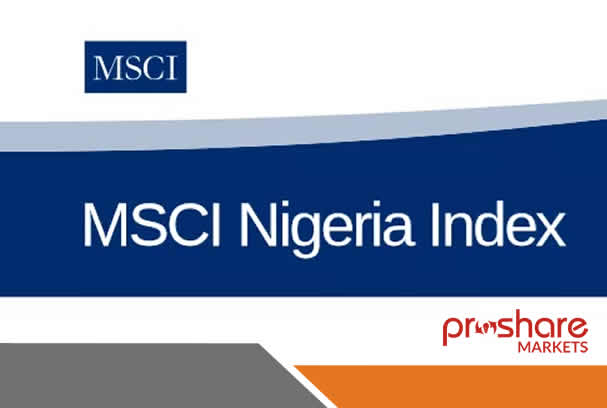Nigeria’s equity market is not a developed market, nor an emerging market but it is a recognised frontier market – so far. Last week MSCI Inc. floated the possibility of removing Nigeria from even this category. We have been here before and, if this happens, the immediate effects will be far from dramatic.
Nigeria’s MSCI Index Eviction, déjà vu?
On 23 June MSCI Inc., a global provider of equity, fixed income and real estate indexes, announced that it is considering removing Nigeria from its Frontier Markets Indexes (MSCI Frontier Markets and MSCI Frontier Markets 100 indexes), citing currency restrictions. Specifically, since March 2020, FX illiquidity and the widening chasm between the official and parallel Naira exchange rates, according to MSCI Inc., have led to FX conversion and fund repatriation problems for foreign investors in the Nigerian equities market. As a result, according to MSCI Inc.: “Market participants have continuously expressed concerns related to the investibility and replicability of the MSCI Nigeria Indexes and related composite indexes, such as the MSCI Frontier Markets Index.”
This is not the first time MSCI Inc has considered removing Nigeria from the MSCI Frontier Markets (FM) Index. In April 2016, a similar situation occurred owing to the Central Bank of Nigeria’s currency restrictions at the time. The market’s view then was that around US$500m in funds benchmarked to the MSCI FM index would head for the exit. In the end, Nigeria was not ejected, FX liquidity improved a year later (2017), and foreign investors bought Nigerian equities again in significant volumes.
The situation now, six years later, is very different in terms of potential impact, in our view. Overall, we expect the impact to be very limited, for two reasons.
First, since the beginning of 2018, around N439.43bn (US$1.04bn at today's rate) of foreign investor money has left the NGX Exchange. Foreign investors only account for around 13% of trading on the exchange compared with a long-term average of around 42%. The foreign funds remaining are either unable to withdraw or remain committed to the Nigerian investment case for the long term.
Second, although it is difficult to estimate the total amount of money benchmarked to MSCI FM indices, we know it is substantially lower than it was in 2016. Many funds have abandoned the benchmark or switched to broader benchmark indices, e.g. the MSCI Frontier Emerging Markets Index. As of April 2022, Nigerian stocks made up only 4.7% of the MSCI Frontier Markets (FM) Index, a far cry from March 2016, where Nigerian stocks made up 11.7% of the MSCI FM Index.
We have studied the factsheets of the remaining FM Exchange Traded Funds (ETF) and some of the largest dedicated FM equity funds and found that if they were to sell their entire remaining holdings in Nigeria, this would account for just $150.0m (N63.1bn) of foreign equity selling.
Interesting, however, is that a lot of the exposure in the funds we looked at are in Airtel Africa, which Is dual-listed and which could imply funds are only invested in the telco stock as a means of using the dual listing for repatriation of funds. Nevertheless, assuming all those funds were liquidated, it would equate to about 13 days of average daily traded value. Even then, the ability to repatriate those funds would not be guaranteed and the process could be protracted, in our view
FX
Last week, the exchange rate at the Investors and Exporters Window (I&E Window) weakened by 0.28% to N420.13/US$1. Elsewhere, the foreign exchange (FX) reserves of the Central Bank of Nigeria (CBN) increased by 0.49% to US$38.88bn, enhancing the ability of the CBN to continue interventions across the various FX windows. It is clear that the CBN, coming to half-way through the year, is comfortable with its FX reserve position, which is high by historic standards and has remained within a narrow range over the past six months. We think the CBN will be able to keep the I&E Window rate close to its current rate for several months, at least.
Bonds & T-bills
Last week, trading in the Federal Government of Nigeria (FGN) bond secondary market was bullish as market participants sought to recover lost bids from the bond auction. As a result, the average benchmark yield for bonds fell by 5bps to close at 11.14%. Notably, the yield on the 3-year (-3bps to 10.09%) and the 10-year (-5bps to 11.60%) bonds declined, while the yield on the 7-year (+6bps to 10.88%) bond expanded. At last week's primary auction, the Debt Management Office (DMO) allotted a total of N226.12bn (US$538.16m). Demand was strong as reflected by a total subscription of N552.36bn and a bid-to-offer ratio of 2.45x. Nevertheless, yields across the March 2025 (+10bps to 10.10%), April 2032 (+5bps to 12.50%) and January 2042 (+15bps to 13.15%) maturities expanded. We are still looking for bond rates to increase if, as expected, issues of government debt increase going forward.
Activity in the Treasury Bill (T-Bill) secondary market was bearish as tight market liquidity induced selloffs. Consequently, the average yield rose by 15bps to 4.79%. However, the yield on the 321-day T-bill fell slightly by 1bp to close at 6.09%. At the T-bill auction this week, the Debt Management Office (DMO) is expected to offer N174.09bn worth of instruments. Elsewhere, the average yield for OMO bills rose by 59bps to 5.17%, while the yield on the 312-day OMO bill expanded by 127bps to 5.74%.
Oil
Last week, the price of Brent closed flat at US$113.12/bbl w/w, after rebounding strongly on Friday to recoup intra-week losses. As a result, Brent is up 45.44% year-to-date and has traded at an average of US$104.62/bbl so far this year, 47.58% higher than the average of US$70.89/bbl in 2021. Oil prices retreated for the most part in the week as attention was focused on the chances of global economic growth slowing down. Indeed, the US manufacturing and services Purchasing Managers’ Index (PMI) showed numbers well below expectations. However, further supply tightness loomed over the market on Friday following expectations of moves against Russian oil and gas exports at the meeting of leaders of the Group of Seven (G7) nations meeting in Germany this week. Oil prices are far in excess of the US$60.00/bbl we regard as the safety zone for Nigeria’s public finances, and appear likely to stay at high levels for several months to come.
Equities
Last week, the NGX All-Share Index fell by 0.14% to settle at 51,705.61 points, the lowest level since 6 May. Consequently, its year-to-date return fell to 21.04%. Flour Mills of Nigeria (-7.14%), FCMB Group (-5.71%), Nigerian Breweries (-5.51%), and Honeywell Flour Mills (- 5.31%) closed negative last week while MRS Oil Nigeria (+9.80%), FBN Holdings (+8.76%) and MTN Nigeria (+4.12%) closed positive. Performances across the NGX sub-indices was broadly negative with NGX Consumer Goods (-2.02%) declining the most, followed by NGX Industrial Goods (-1.89%), NGX Insurance (-1.36%) and NGX-30 (-3.00%) indices. On the flip side, NGX Pension (+0.40%), NGX Banking (+0.33%) and NGX Oil & Gas (+0.32%) indices closed positive
Model Equity Portfolio
Last week the Model Equity Portfolio rose by 0.03% compared with a fall in the NGX Exchange All-Share Index (NGX-ASI) of 0.14%, outperforming it by 17 basis points. So far this year it has gained 23.52% against a 21.04% gain in the NGX-ASI, outperforming it by 247bps.
Last week our slightly underweight notional position in MTN Nigeria (in which we have been making notional sales) delivered a useful 62bps which offset notional losses in BUA Cement (22bps), Dangote Cement (19bps) and Airtel Africa (17bps). Our overall sense is that the market continues to be weak, though with exceptions like MTN Nigeria, FBN Holdings and MRS.
Last week, and as advised on these pages last Monday, we went ahead and made notional sales in MTN Nigeria, Dangote Cement, BUA Cement, Nigerian Breweries, Guinness Nigeria, Flour Mills of Nigeria, Okomu Oil and Presco, raising very close to our target of an additional 500bps of cash to bring the total notional cash position to 18.8% of the portfolio. This is an aggressive cash position: the average over the life of the portfolio so far has been 12.0%.
Going forward, we note again that Nigeria's fixed income markets have not taken on board last month's (24 May) rise in the Monetary Policy Rate from 11.5% to 13.0%, with the FGN bond market bullish last week. Therefore the rival attractions of fixed income investments are not as clear as we thought they would be a month ago. The equity market has pulled back but in aggregate the NGX-ASI is only down 0.47% since the rise in the MPR.
With this in mind, it may be wise not to be over-confident about a continued pull-back in equities. We will observe what happens this week and begin to construct some overweight and underweight positions to benefit from upcoming first-half results in a few weeks' time. We plan no changes in the Model Equity Portfolio this week.
 Lagos, NG • GMT +1
Lagos, NG • GMT +1











 1168 views
1168 views


















 Sponsored Ad
Sponsored Ad
 Advertise with Us
Advertise with Us









